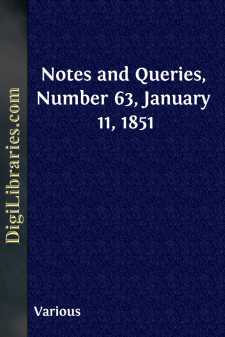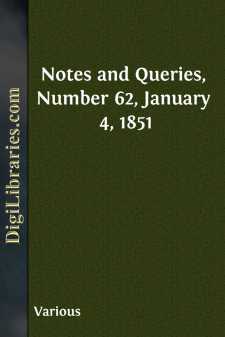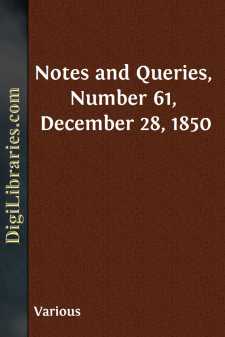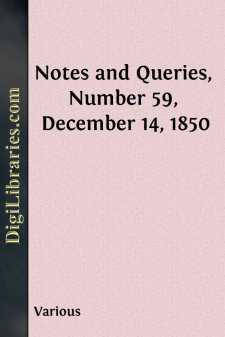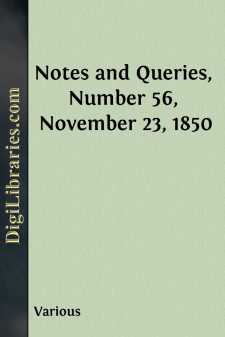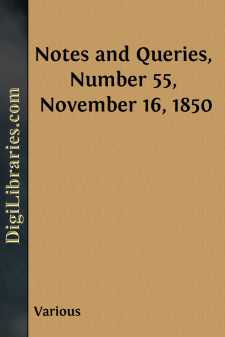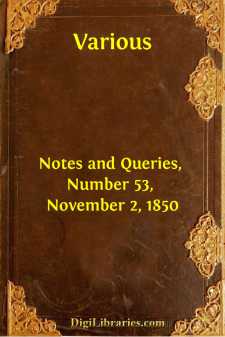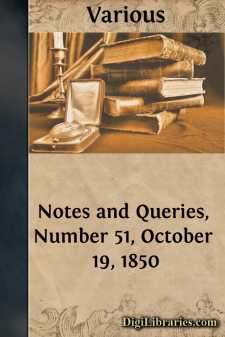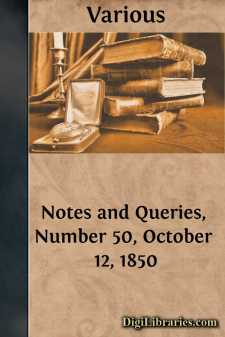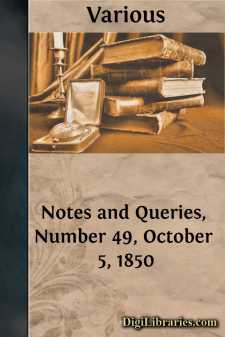Categories
- Antiques & Collectibles 13
- Architecture 36
- Art 48
- Bibles 22
- Biography & Autobiography 813
- Body, Mind & Spirit 142
- Business & Economics 28
- Children's Books 15
- Children's Fiction 12
- Computers 4
- Cooking 94
- Crafts & Hobbies 4
- Drama 346
- Education 46
- Family & Relationships 57
- Fiction 11829
- Games 19
- Gardening 17
- Health & Fitness 34
- History 1377
- House & Home 1
- Humor 147
- Juvenile Fiction 1873
- Juvenile Nonfiction 202
- Language Arts & Disciplines 88
- Law 16
- Literary Collections 686
- Literary Criticism 179
- Mathematics 13
- Medical 41
- Music 40
- Nature 179
- Non-Classifiable 1768
- Performing Arts 7
- Periodicals 1453
- Philosophy 64
- Photography 2
- Poetry 896
- Political Science 203
- Psychology 42
- Reference 154
- Religion 513
- Science 126
- Self-Help 84
- Social Science 81
- Sports & Recreation 34
- Study Aids 3
- Technology & Engineering 59
- Transportation 23
- Travel 463
- True Crime 29
Sort by:
by:
Various
NOTES. THE BREECHES, OR GENEVA BIBLE. Of this, the most popular edition of the Scriptures in the reign of Queen Elizabeth, we meet continually with erroneous opinions of its rarity, and also of its value, which the following brief statement may tend in a degree to correct. The translation was undertaken by certain reformers who fled to Geneva during the reign of Queen Mary; and is attributed to W....
more...
by:
Various
NOTES. OLD BALLAD UPON THE "WINTER'S TALE." Some of your correspondents may be able to give me information respecting an old ballad that has very recently fallen in my way, on a story similar to that of Shakspeare's Winter's Tale, and in some particulars still more like Greene's novel of Pandosto, upon which the Winter's Tale was founded. You are aware that the earliest...
more...
by:
Various
NOTES. ILLUSTRATIONS OF SCOTTISH BALLADS. In the ballad of "Annan Water" (Border Minstrelsy, vol. iii.) is the following verse:— "O he has pour'd aff his dapperpy coat, The silver buttons glanced bonny; The waistcoat bursted aff his breast, He was sae full of melancholy." A very unexpected effect of sorrow, but one that does not seem to be unprecedented. "A plague of sighing...
more...
by:
Various
NOTES. THE FIRST PAPER-MILL IN ENGLAND. In the year 1588, a paper-mill was established at Dartford, in Kent, by John Spilman, "jeweller to the Queen." The particulars of this mill are recorded in a poem by Thomas Churchyard, published shortly after its foundation, under the following title:— "A description and playne discourse of paper, and the whole benefits that paper brings, with...
more...
by:
Various
NOTES. THE OLDENBURG HORN. The highly interesting collection of pictures at Combe Abbey, the seat of the Earl of Craven, in Warwickshire, was, for the most part, bequeathed by Elizabeth, Queen of Bohemia, the daughter of James I., to her faithful attendant, William, Earl of Craven. The collection has remained, entire and undisturbed, up to the present time. Near the upper end of the long gallery is a...
more...
by:
Various
NOTES. AUTHORSHIP OF "HENRY VIII." In returning to the question of the authorship of Henry VIII., I am anxious to remove a misconception under which MR. SPEDDING appears to labour relative to the purport of a remark I made in my last communication to you (Vol. ii., p. 198.) on this subject. As we appear to be perfectly agreed as to the reasons for assigning a considerable portion of this play...
more...
by:
Various
NOTES SHAKSPEARE AND MARLOWE. A special use of, a use, indeed, that gives a special value to your publication, is the communication through its means of facts and conclusions for the information or assistance of editors or intending editors. I do not suppose that any gentleman occupying this position would be guilty of so much disrespect to the many eminent names which have already appeared in your...
more...
by:
Various
NOTES. ROBERD THE ROBBER. In the Vision of Piers Ploughman are two remarkable passages in which mention is made of "Roberd the robber," and of "Roberdes knaves." "Roberd the robbere, On Reddite loked, And for ther was noght wherof He wepte swithe soore." Wright's ed., vol. i. p. 105. "In glotonye, God woot, Go thei to bedde, And risen with ribaudie, The Roberdes...
more...
by:
Various
NOTES. A NOTE ON "SMALL WORDS." "And ten small words creep on in one dull line." Most ingenious! most felicitous! but let no man despise little words, despite of the little man of Twickenham. He himself knew better, but there was no resisting the temptation of such a line as that. Small words he says, in plain prosaic criticism, are generally "stiff and languishing, but they may be...
more...
by:
Various
NOTES. STRAY NOTES ON CUNNINGHAM'S LONDON. The following notes are so trivial, that I should have scrupled to send them on any other ground than that so well-conceived and labouriously-executed a work should have its most minute and unimportant details as correct as possible. This, in such a work, can only be effected by each reader pointing out the circumstances that he has reason to believe are...
more...


